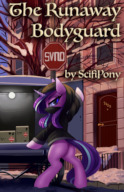Hard Learned Advice to Beginning Authors · 12:09am Dec 17th, 2021
As a beginning author, keep in mind:
- The only successful story is a finished story. ARE YOU WRITING YET?
- Not every idea is a good idea for a story.
- Ideas are useless if you don't write them.
- Ideas are a dime a dozen! If you disagree, please don't argue with me: Make a list of 100 of them. (See next item.)
- Almost no ideas are unique. Feel free to borrow ideas from other authors, including me, just do not rewrite their stories and call them your own.
- If you are having a hard time coming up ideas, consider what you'd really want to tell people if they would only listen. Write about that.
- Not every story is a good story. Learn to recognize this in your own writing and don't spend time fixing it. Move on. It's just practice.
- If you can't figure out how to start the story, write the ending first, or start at whatever point makes you think the story has merit. Alternately, start where the characters keep shouting at you, "This is interesting. I was doing this..."
- Waking up in the middle of the night thinking about a story is a good sign. Get up and write the scene, damn it! Who needs sleep, anyway? You. Are. An author!
- Write every day, or a few times a week at least.
- If you get stuck, work on a different story until you feel you can continue the stuck one, if ever.
- Character, as in that person has character, is the result of living one's life while dealing with adversity, feeling resentment and other emotions for being pushed, and persevering.
- 1st person characters must be candid about themselves, or the narrator must be candid about 3rd person characters. As a crass example, a character might never talk about sexual mistakes or preferences in dialogue, but they must be upfront in narration!
- Ray Bradbury wrote a story a day for years before he published his first story in a magazine. He learned a lot along the way, so none of it was a waste of time.
- If you find writing to hard or it makes you unhappy, fall back to being a reader (and read my current story, The Runaway Bodyguard). Take pride in self-knowledge and move on.
Go write.




Long Form stories very often fail around the 4th chapter. That is typically about how far into the plot a beginning-typical author has any idea what is going to happen in such a story. Then they hit that wall and the story dies.
Always have an exit ramp within 4-6 chapters when writing a long form story. It allows you a chance to tie things up and end the story if you decide to, and separates the story into chunks if you decide not to take an exit ramp.
If you are going to put several months or years into a story, then at least put a week or two fleshing out the concept before you charge headlong.
Always have an idea how long your story is going to be before starting it.
Short form stories get people to follow you. Long form stories get people to follow the story.
Resist the temptation to publish a story when you just have one chapter completed. At least have the second chapter half-way done, and preferably completely finished so you can release it before people lose interest in your story.
If it is your very first story, I recommend either doing short form or mid form. Something around 30,000 words is ideal. It gets you used to fleshing out an idea, and closing it when it is finished.
Read your story out loud before you publish it. If you are getting tongue-tied, something is wrong. You also tend to find a lot more of your errors when reading aloud vs reading silently.
Getting an editor, or at the very least someone else to proofread your work, is strongly advised. However, you need an editor that fits your style and temperament. Some editors don't take kindly to you ignoring their advice. There are errors, and there is style. If your style and their style are not compatible, you will have a hard time.
A good picture, title, and well written, and edited description are key. Nobody will read your story if you have no picture and grammatical errors in your short description.
Nice bits of advice.
5617815
I agree with everything you say, though I will caution a good portion is intermediate level that a beginner shouldn't worry about. Finishing is what a beginner needs to be concerned with. Then repeating the feat.
I advise not the write any long stories until you know what it feels like to complete a story, preferably story after story.
Writing multiple stories reinforces the concept that ideas are a dime a dozen, and if you can produce many, you will survive some being bad. Characters are more precious because they are both reusable and can be modified to fit in other stories, but that is an advanced concept.
Multiple related short stories can very well assemble into longer works*. Study The Runaway Bodyguard. The basic storytelling unit is related short stories composed of a few chapters. A few short stories form a "Part." Some authors call these books, but each is actually a complete novella. I even flirted with releasing them separately. Four parts complete the novel. Keeping stories episodic is a great way to dip your feet in the pool. It also teaches fleshing out characters by sequel iteration.
Starting, writing, and completing is essential. Once you know you can, you can also envision more. If you realize you can't, it's best to learn before you make yourself unhappy**.
Beyond that editors, critiques, and other stuff become necessary to improve craftsmanship. You cover much of that.
Oh, that reading out loud? The best advice. It will help find errors and highlight awkward constructions wonderfully and. as a bonus, teach you to orate. Good prose is musical and has rhythm. Reading around will help you find this.
*My Knight of Equestria series ought to have been one novel, but writing it separately allowed me to write it out of order and, because I was insecure about an OC-centric storyline, it allowed me to feel I could stop at any point.
**In 2001, I realized writing made me unhappy. Check my "since" date on my user page. That's when I discovered writing could make me happy again.
5617910
I've always acted out my scenes. Also I listen a lot of things so I can get a bunch of ideas.
Music is great for that. Hell, I've thought up fight scenes while listening to chill Christmas music.
Oh the places your mind will take you.
5641823
The closest I get to acting is dramatic readings.
Yes to music. It can keep up your spirits, or evoke experiences you can turn into a story idea. These are mine:
Queen’s Another One Bites the Dust inspired my first published novel.
Nataly Merchant’s Carnival inspired an SF novel that takes place in a lost generation ship created from the asteroid Eros. The main character talks with spirits, and there’s a carnival where she has a shamanic experience.
ABBA’s Eagle inspired a third novel.
5641995
Dude, I've been feverishly thinking up ideas for a story for like 3 years now, still coming up with stuff.
I'm not trying to make it perfect, I want to look back on it and be like "huh, I wrote this? This is pretty good, I think I'll read though it again."
Don't try to perfect something, try to inspire your future self through your work.